The US Securities and Exchange Commission (SEC) has recognized the importance of retail investors having more timely access to fund portfolio data. Currently, the regulatory framework requires registered investment companies to provide periodic portfolio holdings data, but this information is often delayed. This delay affects millions of US households and can leave investors with outdated information, especially during market fluctuations like the COVID-19 pandemic.
While the SEC is focused on regulatory measures against crypto companies, Commissioner Jaime E. Lizárraga overlooks the potential solution offered by blockchain oracles. Platforms like Chainlink act as intermediaries connecting blockchains with external data sources. By enabling smart contracts to execute based on real-world inputs and outputs, blockchain oracles bridge the gap between on-chain and off-chain data environments.
Benefits of Decentralized Oracle Networks
Decentralized oracle networks (DONs) enhance the security and reliability of data transmission to blockchains. Chainlink, for example, has demonstrated its ability to provide real-time data feeds for decentralized finance (DeFi) applications. These systems access various data sources, such as APIs and IoT devices, to create innovative decentralized applications that rely on accurate real-world data.
Chainlink’s collaboration with financial institutions like Fidelity International and Sygnum showcases its potential to bring Net Asset Value (NAV) data on-chain. This collaboration provides real-time transparency and accessibility for fund portfolio data, benefiting both investors and the SEC in evaluating market trends and risks promptly.
The integration of blockchain oracles into the financial ecosystem could address the SEC’s concerns by offering retail investors timely and standardized access to fund portfolio data. This would not only enhance investor protection but also improve the Commission’s ability to monitor market trends and risks in real-time. While current reforms are a step in the right direction, further amendments are needed to ensure retail investors are not disadvantaged by delayed access to essential financial information.
By leveraging blockchain oracles like Chainlink, the financial industry can revolutionize the way fund data is accessed and utilized, ultimately benefiting both investors and regulatory bodies like the SEC.


Leave a Reply